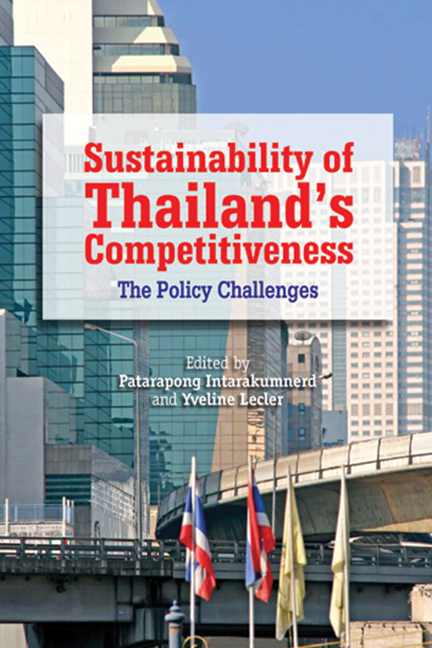Book contents
- Frontmatter
- Contents
- Preface
- Abbreviations
- Contributors
- Introduction
- Part I Thailand's Industrial Development: General Views
- Part II The Roles of Institutions: Clusters and Industrial Estates
- 4 Industrial Restructuring Policies in Thailand: Japanese or American Approach
- 5 The Role of Industrial Estates in Thailand's Industrialization, New Challenges for the Future
- Part III Firms and Government New Initiatives: The Industry Analysis
- Index
4 - Industrial Restructuring Policies in Thailand: Japanese or American Approach
from Part II - The Roles of Institutions: Clusters and Industrial Estates
Published online by Cambridge University Press: 21 October 2015
- Frontmatter
- Contents
- Preface
- Abbreviations
- Contributors
- Introduction
- Part I Thailand's Industrial Development: General Views
- Part II The Roles of Institutions: Clusters and Industrial Estates
- 4 Industrial Restructuring Policies in Thailand: Japanese or American Approach
- 5 The Role of Industrial Estates in Thailand's Industrialization, New Challenges for the Future
- Part III Firms and Government New Initiatives: The Industry Analysis
- Index
Summary
1. INTRODUCTION
East Asian governments seem to have adopted three different types of policies on industrial promotion when doing national planning for economic development in the past. (Suehiro 2008, Ch. 6).
The first type is an industry-specific policy, in which the government intentionally selects several industries and promotes them by employing trade restrictions on imported goods, and providing government subsidies, tax incentives, and loans. The main policy objective is to create national or indigenous industrial entrepreneurs who will compete with foreign firms advancing into domestic market. Typical of this kind of policy is strategic promotion of industries such as machinery and electronics goods in Japan in the 1950s and the 1970s, and in South Korea and Taiwan between the 1960s and the 1980s (Hashimoto et al. 1998; Wade 1990).
The second type is a more moderate industrial promotion policy, in which the government provides a set of policy incentives to local and foreign companies in promoted industries. Compared with the first type in which the governments preferred an industry-specific approach and a policy of loans, the second type covers a wider rage of industries, and offers tax incentives rather than loans. At the same time, foreign investors are usually granted the same privileges or incentives as local ones to serve as important contributors to industrial development. Unlike in Japan, South Korea, and Taiwan, the principal purpose of this policy is to promote import-substitution type of industrialization of the country rather than foster local industrial firms (Somsak 1981). For this reason, foreign firms have frequently played an essential role in the development of major industries. Typical cases can be seen in the experiences of Thailand and Indonesia between the 1960s and 1980s, or Malaysia, before the government decided to adopt a comprehensive policy in favour of a group of bumiputera in 1981 (Gomez 1997).
- Type
- Chapter
- Information
- Sustainability of Thailand's CompetitivenessThe Policy Challenges, pp. 129 - 173Publisher: ISEAS–Yusof Ishak InstitutePrint publication year: 2010



